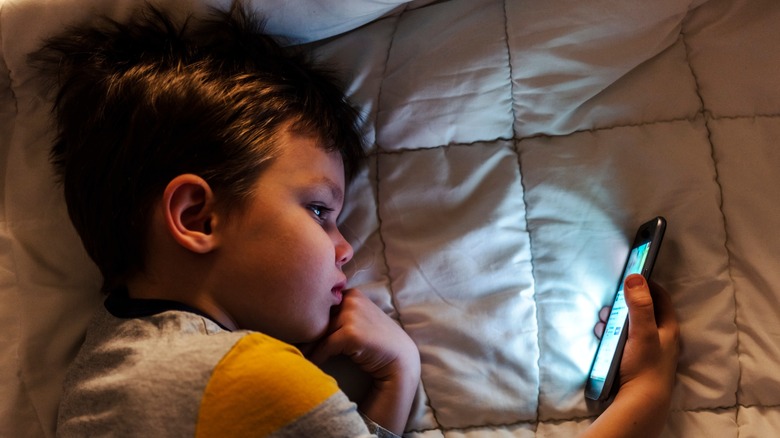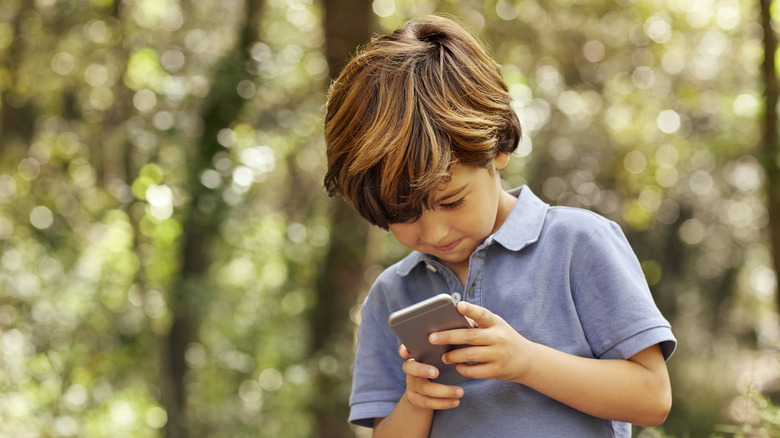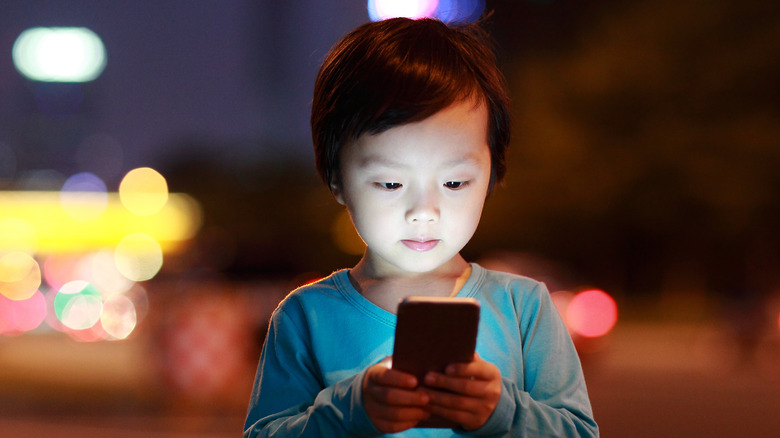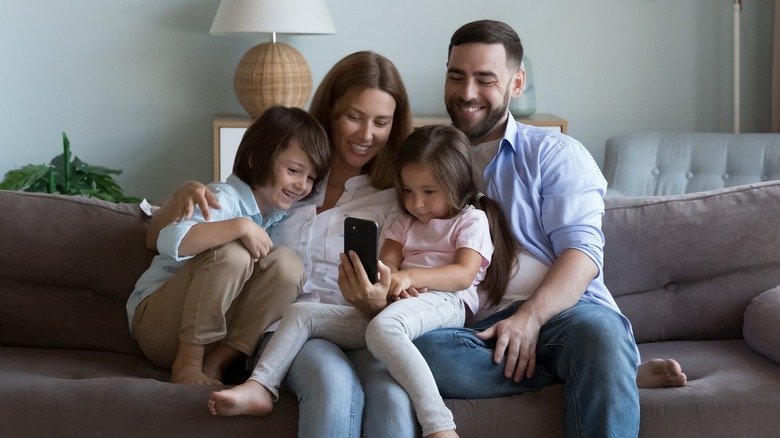Why Screen Time May Harm Development In Babies
As screens continue to make inroads into our daily lives, their physical as well as psychological impact has become a topic of debate in the medical community. In the past few years, multiple research papers have worked to illuminate the detrimental impact of easily accessible devices like phones and tablets, especially on children's physical and mental well-being. A fresh study focused on children at one year of age found that excessive screen time is linked with delayed development of crucial skills such as communication, motor functions, and problem-solving capabilities.
According to the study, "greater screen time for children aged 1 year was associated with developmental delays in communication and problem-solving at ages 2 and 4 years." Just to be clear here, the study couldn't establish a definitive causal link between screen time exposure and development delays, but the test results found a pattern suggesting that screen time could at least be one contributing issue.
The research, which has been published in The Journal of the American Medical Association Pediatrics, examined the impact of screen time exposure in children as young as one year and examined how it affects the five key cognitive development domains. The team targeted communication, fine motor, gross motor, problem solving, and social-personal skills as part of the analysis, and then used the Ages & Stages Questionnaires to assess the signs of development delays among 7,097 children that were part of the study.
The scope of direct risks
The team found that in kids that were exposed to four or more hours of screen time, development delays affected their communication and problem-solving skills across the ages two and four years. Across the board, the team deduced that at the age of 2 years, delays affected communication (5.1%), gross motor skills (5.6%), fine motor (4.5%), problem solving (4.2%), and social and personal skills (5.5%). Similar effects were observed at the age of four years, but to a smaller magnitude.
Moreover, the effects seem to fade away in some areas over time. "Screen time for children aged 1 year was associated with the fine motor and personal and social skills domains at age 2 years; however, this association was not confirmed at age 4 years," says the paper. The study, however, was able to confirm a dose-response link between screen time exposure at one year of age, and how it is associated with development delays at ages two and four years.
Research published in the Cognitive Development journal also notes that excessive screen use hinders a child's development, adding that "programs aimed at young children should be adapted to the child's cognitive abilities and encourage parent child-child co-use." Another study, courtesy of experts at Canada's University of Calgary, surmised that children exposed to screens in the first two years of their life performed worse on development tests by the time they reached three.
What do other studies say?
A paper published in the Journal of National Medical College notes that even the most customized educational apps and games are not enough to offer the kind of learning skills of those that can be imparted by human guardians. Screens are also said to be insufficient when it comes to inculcating logical reasoning skills towards strengthening their language skills, object labeling, and memory difficulties.
While there is little evidence to suggest that exposure to screens leads to eye-related issues, there has been a myopia boom in recent years as more kids stay glued to screens indoors instead of going outdoors. "After studying more than 4,000 children at Sydney primary and secondary schools for three years, they found that children who spent less time outside were at greater risk of developing myopia," says a research published in Nature.
Then there is the behavioral side of screen time risks. Research published in The Journal of the American Medical Association Pediatrics notes that when parents use devices like phones and tablets to calm their kids (age 3 to 5), it can hinder the development of their emotion-regulation strategies, leading to "more intense emotional reactions, more impulsivity, and less organized behavior, making them more challenging to parent without social media."
What experts have to say?
The topic of screen time is contentious. On one hand, they have become one of the default methods for imparting education, but experts are divided over what should be the minimum age when screen exposure should begin. The World Health Organization recommends that kids below the age of two years should not have any form of regular screen exposure, and for kids of up to four years of age, screen time should be limited to one hour at the maximum, especially if it's not related to phyiscal activity.
But even when it comes to teaching and acquiring new skills, human touch is more important than letting screens do the job. "You get genius learning from a live human being, and you get zero learning from a machine," leading brain scientist Patricia Kuhn told UNICEF. In the blog post penned by director of Brain Matter, Carlotta Nelson, the agency mentions that screen exposure tends to have a negative impact on attention span and focus development.
Impulse control is also said to degrade, as does children's ability to understand and convey human emotions while the lack of crucial human intervention takes a toll. That's because until babies develop language capabilities, the ability to read human faces and interpret them is how they communicate. This human-driven two-way interaction channel is not only crucial to facilitate communication and emotional exchange, but also affects brain development.
How to manage screen time as a parent
Intervention and vigilance are two core areas where parents of young children need to pay special attention. Raising Children, which is supported by the Australian government, suggests that for children below two years of age, the only form of screen time exposure they should be getting is video calls. Parents are advised to keep their phones and laptops away when interacting with kids and make sure that they engage in real-world activities, preferably outdoors.
The American Academy of Pediatrics suggests that for kids below two years of age, parents should make sure that children are not alone when looking at a screen. Moreover, screen time should be allowed only for viewing healthy or carefully-vetted helpful content. The U.K.'s non-profit National Childbirth Trust (NCT) says screen time exposure in children up to three years of age is known to negatively impact sleep patterns and contributes to anxiety. It strongly advises against screen access for children below two years of age.
From a technical perspective, both Android and Apple devices offer a screen time management tool for parents. On iPhones and iPads, it is called Screen Time and can be accessed from within the Settings app. Family Sharing is another tool that lets parents set up screen time rules for their children. Mayo Clinic suggests parents should create tech-free zones for their children and focus on interactive experiences, rather than letting kids watch content on a screen.




